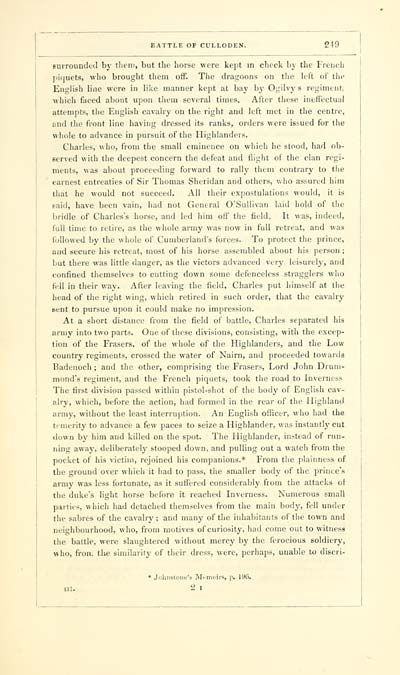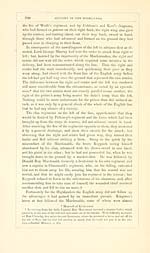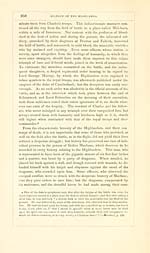Download files
Complete book:
Individual page:
Thumbnail gallery: Grid view | List view

BATTLE OF CULLODEN. 249
suiTOundeil by tlieni, but the horse were kept m check by the French
piquets, who brought tliem off. The drajjoons on the U'ft of tlie
English line were in like manner kept at bay by Ogilvy s regiment,
which faced about upon tliem several times. After these ineffectual
attempts, the English cavalry on the right and left met in the centre,
and the front line having dressed its ranks, orders were issued for the
whole to advance in pursuit of tlie Higlilandeis.
Charles, who, from the small eminence on wliicli ho stood, had ob-
served with the deepest concern the defeat and flight of the clan regi-
ments, was about proceeding forward to rally them contrary to the
earnest entreaties of Sir Thomas Sheridan and others, wlio assured him
tliat he would not succeed. All their CNpostuIations would, it is
said, have been vain, had not General O'SuUivan laid hold of the
bridle of Charles's horse, and led him oft' the field. It was, indeed,
full time to retire, as the whole army was now in full retreat, and was
followed by the whole of Cumberland's forces. To protect the prince,
and secure his retreat, most of his horse assembled about his person ;
but there was little ilanger, as the victors advanced very leisurely, and
confined themselves to cutting down some defenceless stragglers who
tell in their way. After leaving the field. Charles put himself at the
head of the right wing, wliich retired in such order, that the cavalry
Bent to pursue upon it could make no impression.
At a short distance from the field of battle, Charles separated his
army into two parts. One of these divisions, consisting, with the excep-
tion of the Erasers, of the whole of the Highlanders, and the Low
country regiments, crossed the water of Nairn, and proceeded towards
Badenoch ; and the other, comprising the Erasers, Lord John Druni-
mond's regiment, and the French piquets, took the road to Inverness
The first division passed within pistol-sliot of the body of English cav-
alry, which, before the action, luid formed in the rear of the Highland
army, without the least interruption. An English officer, who had the
t<nierity to advance a few paces to seize a Highlander, was instantly cut
down by him and killed on the spot. The Highlander, instead of run-
ning away, deliberately stooped down, and pulling out a watch from the
pocket of his victim, rejoined his companions.* Erom the plainness of
the ground over which it had to pass, the smaller body of the prince's
army was less fortunate, as it suffered considerably from the attacks of
the duke's light horse before it reached Inverness. Numerous small
parties, which had detached themselves from tlie main body, fell under
the sabres of the cavalry; and many of the inhabitants of the town and
neighbourhood, who, from motives of curiosity, had come out to witness
the battle, were slaughtered without mercy by the ferocious soldiery,
who, fron. the similarity of their dress, were, perhaps, unable to discri-
♦ Joliiisloiic's M.miiirs, p. 19G.
HI. 2 I
suiTOundeil by tlieni, but the horse were kept m check by the French
piquets, who brought tliem off. The drajjoons on the U'ft of tlie
English line were in like manner kept at bay by Ogilvy s regiment,
which faced about upon tliem several times. After these ineffectual
attempts, the English cavalry on the right and left met in the centre,
and the front line having dressed its ranks, orders were issued for the
whole to advance in pursuit of tlie Higlilandeis.
Charles, who, from the small eminence on wliicli ho stood, had ob-
served with the deepest concern the defeat and flight of the clan regi-
ments, was about proceeding forward to rally them contrary to the
earnest entreaties of Sir Thomas Sheridan and others, wlio assured him
tliat he would not succeed. All their CNpostuIations would, it is
said, have been vain, had not General O'SuUivan laid hold of the
bridle of Charles's horse, and led him oft' the field. It was, indeed,
full time to retire, as the whole army was now in full retreat, and was
followed by the whole of Cumberland's forces. To protect the prince,
and secure his retreat, most of his horse assembled about his person ;
but there was little ilanger, as the victors advanced very leisurely, and
confined themselves to cutting down some defenceless stragglers who
tell in their way. After leaving the field. Charles put himself at the
head of the right wing, wliich retired in such order, that the cavalry
Bent to pursue upon it could make no impression.
At a short distance from the field of battle, Charles separated his
army into two parts. One of these divisions, consisting, with the excep-
tion of the Erasers, of the whole of the Highlanders, and the Low
country regiments, crossed the water of Nairn, and proceeded towards
Badenoch ; and the other, comprising the Erasers, Lord John Druni-
mond's regiment, and the French piquets, took the road to Inverness
The first division passed within pistol-sliot of the body of English cav-
alry, which, before the action, luid formed in the rear of the Highland
army, without the least interruption. An English officer, who had the
t<nierity to advance a few paces to seize a Highlander, was instantly cut
down by him and killed on the spot. The Highlander, instead of run-
ning away, deliberately stooped down, and pulling out a watch from the
pocket of his victim, rejoined his companions.* Erom the plainness of
the ground over which it had to pass, the smaller body of the prince's
army was less fortunate, as it suffered considerably from the attacks of
the duke's light horse before it reached Inverness. Numerous small
parties, which had detached themselves from tlie main body, fell under
the sabres of the cavalry; and many of the inhabitants of the town and
neighbourhood, who, from motives of curiosity, had come out to witness
the battle, were slaughtered without mercy by the ferocious soldiery,
who, fron. the similarity of their dress, were, perhaps, unable to discri-
♦ Joliiisloiic's M.miiirs, p. 19G.
HI. 2 I
Set display mode to: Large image | Transcription
Images and transcriptions on this page, including medium image downloads, may be used under the Creative Commons Attribution 4.0 International Licence unless otherwise stated. ![]()
| Early Gaelic Book Collections > Ossian Collection > History of the Highlands and of the Highland clans > Volume 3 > (283) |
|---|
| Permanent URL | https://digital.nls.uk/79655818 |
|---|
| Description | Vol. III. |
|---|---|
| Shelfmark | Oss.249 |
| Attribution and copyright: |
|
| Description | Selected books from the Ossian Collection of 327 volumes, originally assembled by J. Norman Methven of Perth. Different editions and translations of James MacPherson's epic poem 'Ossian', some with a map of the 'Kingdom of Connor'. Also secondary material relating to Ossianic poetry and the Ossian controversy. |
|---|
| Description | Selected items from five 'Special and Named Printed Collections'. Includes books in Gaelic and other Celtic languages, works about the Gaels, their languages, literature, culture and history. |
|---|

